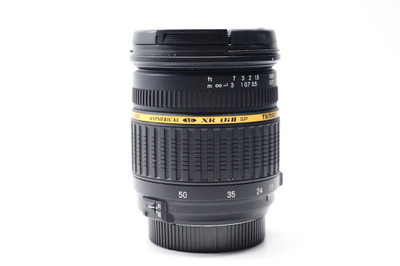
Tamron
Pre-Owned - Tamron 17-50mm F/2.8 Canon EF-S SPH XR Di II SP LD
The SP AF17-50mm F/2.8 is a lightweight, compact, fast standard zoom lens designed exclusively for digital SLR cameras, expanding the product concept of the popular SP AF28-75mm F/2.8 zoom lens. In addition, portrait shots are made beautiful with the natural out-of-focus effect characteristic provided by the fast F/2.8 aperture. Additionally, a broader photographic expression through the use of faster shutter speeds as a result of the maximum aperture offers enhanced photographic pleasure. The lens boasts one of the best close-up shooting performances in the class of fast standard zoom lenses designed exclusively for digital cameras and featuring an F/2.8 maximum aperture throughout the entire zoom range, to ensure stress-free photographic shots at all focal lengths and distances.
AF18-200mm F/3.5-6.3 XR Di II Highlights
Di II
Lenses are designed for exclusive use on digital cameras with smaller-size imagers and inherit all of the benefits of our Di products. These lenses are not designed for conventional cameras and digital cameras with image sensors larger than 24mm x 16mm.
Extra Refractive Index Glass (XR)
Extra Refractive Index (XR) glass can bend light rays at steeper angles, thereby decreasing the physical length of the lens while enhancing imaging performance by minimizing optical aberrations. This has allowed Tamron to develop a line of shorter, smaller-diameter, lighter lenses without sacrificing lens speed, and actually upgrading image quality compared to older designs. XR glass is costlier than conventional glass but it yields enhanced optical power distribution, making possible many of the outstanding and innovative lens designs that bear the XR designation. XR glass, with its superior light-bending power, makes it possible to design a short-barrel lens with the same light-gathering ability (aperture value) as a long-barrel lens—even with a smaller lens diameter. By using this principle Tamron has been able to shorten the length of the entire optical system and produce lighter, more compact lenses of the same speed, and also to provide greater zoom ranges in lenses that are much more convenient to carry by hand.
Low Dispersion (LD)
Low dispersion (LD) glass elements in a lens help reduce chromatic aberration; the tendency of light of different colors to come to different points of focus at the image plane. Chromatic aberration reduces the sharpness of an image, but glass with an extremely lowdispersion index, has less of a tendency to separate (defract) a ray of light into a rainbow of colors. This characteristic allows the lens designer to effectively compensate for chromatic aberration at the center of the field (on axis), a particular problem at long focal lengths (the telephoto end of the zoom range), and for lateral chromatic aberration (towards the edges of the field) that often occurs at short focal lengths (the wide-angle end of the zoom range.)
Super Performance (SP) for Discriminating Shooters
Tamron SP (Super Performance) series is a line of ultra-high-performance lenses designed and manufactured to the exacting specifications demanded by professionals and others who require the highest possible image quality. In creating SP lenses Tamron’s optical designers put their foremost priority on achieving superior performance parameters—they are all designed to a higher standard with little regard for cost constraints. As a result, Tamron lenses bearing the SP designation feature impressive and innovative designs that have established an enviable reputation for excellence among those knowledgeable photographers that demand the very best.
Zoom Lock (ZL)
Another original Tamron mechanical engineering concept is the Zoom Lock (ZL), a simple convenience feature that prevents undesired extension of the lens barrel when carrying the camera/lens unit on a neck strap.